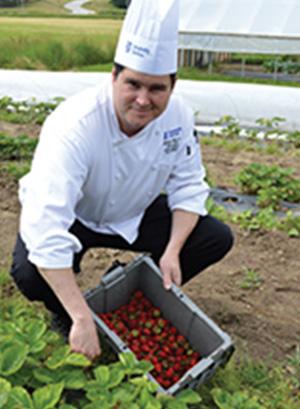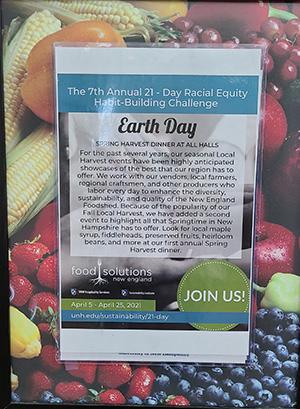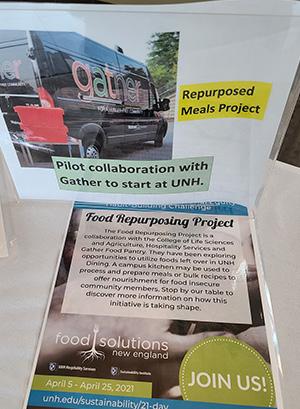Each April, UNH welcomes the Food Solutions New England’s 21-Day Racial Equity Habit-Building Challenge to our campus community. Designed to create dedicated time and space to build more effective social justice habits, UNH students, staff and faculty together have been building skill and will to address racial inequities, using the Challenge as a tool. Participants in the Challenge receive a daily email "prompt" with a short reading, video, or audio file and are encouraged to take about ten to fifteen minutes each day with the material. Additional resources are provided for deeper digging into the day’s topics. This year’s theme is From Me to We: Building a Culture of Wellbeing and Belonging. Through cross-campus collaborations, a unique suite of events and activities are also hosted on campus during the 21 days of the Challenge.
In this blog mini-series, we share stories of the different ways our community is utilizing and embracing the Challenge to contribute to an equitable world.

Chef Todd at a campus farm
In this first of the series, we chatted with Chef Todd Sweet, Senior Executive Chef at UNH, to learn how UNH Dining is doing their part to support a sustainable and equitable food system.
Food is a common thread across humanity and is often a draw for participation in so many things. In 2019, Karen Spiller, Thomas W. Haas Professor in Sustainable Food Systems, approached Chef Todd Sweet, Bill McNamara, and David Hill from UNH Dining about collaborating on potential events and resources for the 2020 21-Day Challenge on campus. They were immediately on board. Dining was “making decisions that already were consistent with the 21-Day Challenge”, so it was a natural fit for them to participate in activities being planned to accompany the Challenge on campus.
As with most things globally that spring, in-person plans fell apart, but Dining remained committed by engaging our community virtually. Chef Todd made cooking demonstration videos which highlighted food from around the world with accessible foods that might be commonly found in a home pantry. Chef Todd noted, “we were also able to feature vendors and talk about some of ‘the why’ we make the decisions about purchasing that we do and what criteria we try to bring into the process so we can have food that adheres to the values of the university. We are looking for minority owned businesses, we're looking for those other kinds of businesses that are local and that's just always been a part of our decision-making process.”

2021 saw the return of in-person events to the Challenge on campus, such as the 1st annual Spring Harvest Dinner
Chef Todd also talked about sourcing foods certified for their sustainable and equitable practices, such as Maine Stewardship Council certified or Gulf of Maine Research Institute certified foods. They also seek out Fair Trade products, like Pierce Brothers Coffee. “Much of the coffee that we source from them is Fair Trade, not 100% but the majority is, so we have signage right there at the coffee station so people who may not know that we buy the coffee for more than just the amazing flavor. It's also for the fact that we like their values, like the way they operate their business.”
And it’s not just food sourcing and purchasing that’s on their minds. From the way the food is presented, to the language they use for ingredients and meals, the UNH Dining team is thinking of how to be culturally sensitive, respectful, and inclusive. For example, during their Black History lunch they worked to reflect the diversity of African cuisine, “we actually not only just brought in African American dishes, but we also tried to bring in dishes from the Caribbean, from Africa itself, and other areas too using solid sources including Chef Kevin Mitchell, a scholar of Black cuisine.”

2021 Harvest Dinner display featuring vendors and other sustainable practices by UNH Dining, such as the food repurposing program and partnership with local food pantry, Gather.
How does Chef Todd feel about being a part of the Challenge and embedding equity, diversity and sustainability into his work? “I'm just thrilled to be part of it. We're always thrilled to prepare foods from different cultures and are pleasantly surprised at the reception that they get – the spiciest food, the food with the most unfamiliar seasonings, seem to go over just as well as the comfort classics. We're super happy to be able to offer that.”
This April, when you enjoy a meal in the dining halls, be sure to find the signage and learn about the equitable, local, and sustainable vendors that will be featured each day during the Challenge. And know that year-round, the Dining team is working daily, to do their part to bring sustainable, equitable, and diverse foods to our community.
